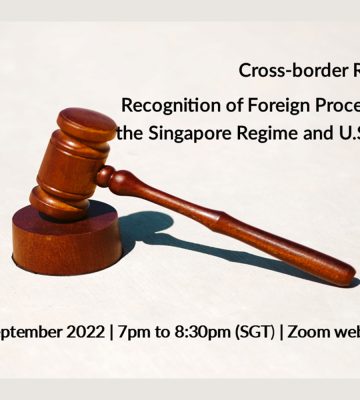On September 9, ABLI held its webinar Rise of Pre-pack as a Restructuring Tool – Global and Regional Perspectives with speakers Aurelio Gurrea-Martínez, Assistant Professor of Law, Singapore Management University, Debby Lim, Director, BlackOak LLC, Dan T. Moss, Partner, Jones Day and Dr Neeti Shikha, Associate Dean, Indian School of Public Policy, New Delhi. Dr Neeti was Head of Centre for Insolvency and Bankruptcy, Indian Institute of Corporate Affairs.
Professor Aurelio kicked off the session with a global overview of pre-packs. He mentioned that although the term “pre-pack” is used in many countries, what this concept means differed in different jurisdictions. So did the actual type of pre-packs used in a jurisdiction. International divergences of pre-packs could also be found in aspects such as whether pre-packs are regulated by legislation and whether eligibility requirements are imposed on debtors. Professor Aurelio concluded his presentation by explaining that while pre-pack was typically understood to be able to generate significant savings both in direct and indirect costs, challenges such as opportunism of shareholders and secured creditors remain.
Dan was the next to take the stage to walk the audience through pre-packs in the United States. The US pre-pack is a court-supervised restructuring in which the debtor negotiates the terms of, and solicits votes on, a plan of reorganization before filing for Chapter 11. Apart from the more “traditional” types of pre-packs, Dan mentioned that there are now ultra-fast or 24-hour prepacks which are becoming more common. He expanded on the most recent 24-hour prepack case of Belk Inc where the plan was confirmed with 20 hours. In addition, Dan touched on the pros (such as speed and elimination of holdouts) and cons (such as the lack of an automatic stay) of a US pre-pack, as well as potential challenges (such as disclosure and solicitation) in conducting a pre-pack. Going forward, he believed that pre-packs would remain popular because of their faster speed and lower cost, although the US would need to keep up now that faster and lower-cost forms of restructuring have become available to any entity with “substantial connections” to countries such as the UK, the Netherlands and Singapore.
Following Dan was Debby who talked out the Singapore pre-pack, a pre-packaged scheme of arrangement. Debby explained that the pre-pack procedure typically had four stages, eliminating the need to apply to the Court for leave to convene a creditors’ meeting and the need to actually hold that meeting. The first stage would typically involve application for the enhanced moratorium under s64 of the Insolvency, Restructuring and Dissolution Act. Next, the debtor would send scheme documents to creditors. Full and fair information disclosure is necessary to enable the creditors to vote meaningfully. In the third stage, the court would sanction the scheme provided that statutory requirements are met. Finally, a copy of the court order approving the scheme must be lodged with the Company Registrar. Debby went on to discuss in more detail the first pre-pack reported in Singapore involving Hoe Leong Corporation. Debby led that pre-pack which was conducted under the section211I of the then Companies Act.
Last but not least, it was Dr Neeti‘s turn to speak about the “youngest” pre-pack in this session. The pre-packaged insolvency resolution process was introduced in India in April 2021 and is currently available only to micro, small and medium-sized enterprises (MSMEs). Some salient features of the Indian pre-pack listed by Dr Neeti included a limited moratorium, a 120-day time limit and the Swiss Challenge model of the base resolution plan. She also mentioned that the first and primary concern for pre-packs in India is that this process was seen as a replacement of the creditor-in-control model. Other concerns included, among others, abuse by promoters and the suitability of this procedure-heavy process to MSMEs.
The speakers then took multiple questions from the audience, ranging from members of the judiciary, to government officials, academics and practitioners.
ABLI thank all speakers for their detailed presentations and are grateful for the support from our attendees who joined us that evening in Singapore across time zones from the US, Europe and various locations in the Asia Pacific.
We look forward to more exchanges in our next webinars.



![[Interview] Recent Developments in India-Related [Interview] Recent Developments in India-Related](https://abli.asia/wp-content/uploads/elementor/thumbs/Interview-Recent-Developments-in-India-Related-r77clpskrkv3owdefr5c8bp2q928jt9giaedo7tork.jpg)
![[Interview] Landmark Indonesian Recognition [Interview] Landmark Indonesian Recognition](https://abli.asia/wp-content/uploads/elementor/thumbs/Interview-Landmark-Indonesian-Recognition-r77cnxouwhwh3r5ch7omm9j9804fq32n59ungqj82o.jpg)


